Managing the Complex Presentations of Parkinson's Disease
Meredith Roberts Lo, PT, DPT
Includes all course content in digital format
Prerequisites Required
Description
Close to 1 million people have Parkinson's in the U.S. This results in over $52 billion spent on health care and lost wages according to the Parkinson's Foundation's recent study. As therapists we are seeing more and more individuals not only with typical Parkinson's but more complex movement disorders. Are your treatment strategies effective enough or are you throwing darts at the wall? Our interventions must be specific and intense to reduce the risk of falls and return patients to their ADLs effectively and quickly. With the right understanding of complex motor control impairments and treatment tools you can optimize your outcomes and continue to be reimbursed for therapy. Avoid banging your head against the wall and get the treatment techniques you need to help optimize your patients' outcomes in Parkinson's. Go beyond the basics.
This workshop will enhance your basic understanding of Parkinson's disease and allow you to optimize your patient outcomes in this complex movement disorder. No two patients are alike, and atypical Parkinson's disease often shows up in our patient presentations along with difficult to manage motor and non-motor impairments. These symptoms can often limit the effectiveness of our interventions.Throughout this course we will examine key components of complex movement disorders to understand them more fully. Through case and video examples we will apply treatment strategies that are effective, and evidence based. At the end of this course, you will be able to identify key impairments in Parkinson's and appropriately treat them. This will allow you to optimize your outcomes with the patient including improving balance, gait, and ADLs.
Highlights
- Immediately improve your patients' motor control and balance using practical treatment techniques
- Dig deeper into the 10 challenges limiting your interventions with more complex presentations of Parkinson's
- Practical treatment strategies to address motor and non-motor impairments you can use the next day
- Effective, evidence-based interventions for Atypical Parkinson's, dystonia, dyskinesia, postural control or Pisa syndrome, and nonmotor impairments
- Video case examples to enhance understanding of key concepts and to spark intervention creativity
Learning Objectives
- Analyze the presentation of atypical Parkinson's, non-motor symptoms, and complex motor control impairments.
- Apply effective treatment concepts to improve patient outcomes based upon enhanced understanding of principles.
Course Content
| Managing the Complex Presentations of Parkinson's Disease | SCORM Package | ||
| Next Steps | Module |
- Atypical and Parkinson's Plus Syndromes
- Identifying and understanding the 3 main types
- Effective treatment strategies for PT and OT to optimize motor control
- Treatment of postural control and Pisa syndrome
- Management of cognition and errorless learning
- The importance of dual tasking and providing structure to management
- Recognizing dystonia and dyskinesia
- Quick tips to manage
- Management of Influencers on our Treatment Outcomes
- Key non motor symptoms that limit your patients progress
- Effective treatment strategies for PT and OT to manage non motor symptoms
- Understanding the impact of medication management on Parkinson's
- Understanding deep brain stimulation and the therapist's role in management
- Understanding the young onset PD community
DISCLOSURES
FINANCIAL: Meredith Roberts Lo is compensated as the owner of Roberts Empowered Movement Center LLC as well as by Summit as an instructor.
NONFINANCIAL: Meredith Roberts Lo has no nonfinancial relationships to disclose.
Click here to check accreditation for this course.